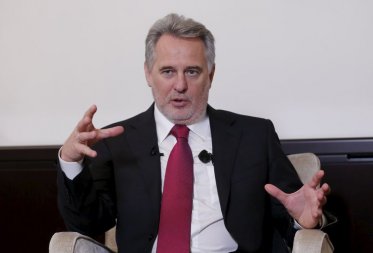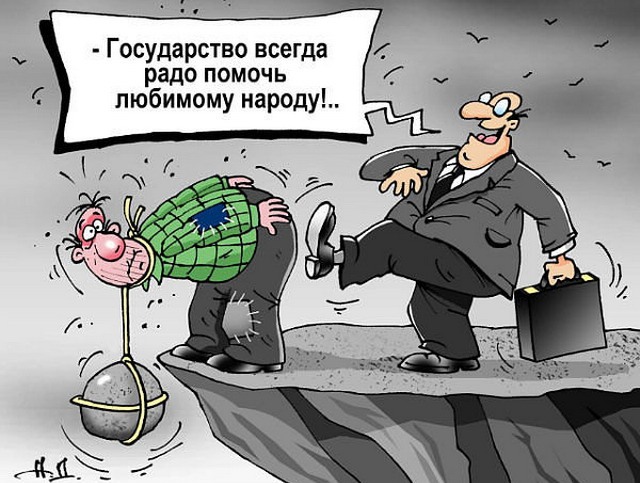The arrest of Dmytro Firtash may be the beginning of the end of the dangerous international mafia whose money and contacts helped increase the influence of the criminal Russian regime.
February 21, 2017, may enter modern history as the starting point of processes that can bury the political elites of a whole group of countries. This is first time that international justice may get hold of such a big “fish” –one that is alive and filled with the caviar of confidential information.
But, most importantly, this “fish” may simply have nowhere to go and have no reason to shield accomplices.
The allegations made against Firtash are so serious that he has a very simple choice: either make a deal with the prosecution — American or European — while, obviously, risking his own life, the price of which is growing exponentially, or else spend the next 50 years in prison in order to go free when none of the dangerous people will still be alive. But he needs to remain alive himself till then.
We have become used to viewing Firtash’s adventures within the context of Ukrainian events, trying to understand how his fate will affect the balance of power on the national political or business stage, what groups will be weakened, and what groups will be strengthened. Yes, certainly, all this is very important.
Yes, the collapse of Firtash can lead to a very rapid collapse of the entire group codenamed “RosUkrEnergo”, the disappearance from the scene of Serhiy Liovochkin and Yurii Boiko (allies of former president Viktor Yanukovych — Ed.), the strengthening of Renat Akhmetov and Borys Kolesnikov (pro-Russian oligarchs — Ed.), and a new caliber of influence by Victor Medvedchuk (Putin’s close friend and head of a pro-Russian party in Ukraine — Ed.). All this is true and yet it is not very interesting, because the issue is the redistribution of spheres of influence in the same “sandbox” of political and oligarchic forces that historically have been close to the Kremlin. (Although it is clear that the change of ownership at the Inter TV channel, for example, will finally reduce the influence of Russian propaganda to several provocative “news” channels. But this is a side effect.
We need to understand that Firtash is not Pavlo Lazarenko, who, when he ended up in the US, could share masses of information about Ukrainian deal-making with the prosecution, but the Americans never knew what to do with these secrets of the primitive tribe. Firtash, however, is a player on an international scale.
He is not at all a Ukrainian “oligarch.” He is a person who has been designated a Ukrainian oligarch in order to shield the complex enrichment schemes by Russian officials using Ukrainian means. Many fortunes have been accumulated in Russia this way, starting with the most important ones.
And the Russian trust in Firtash is not accidental. It is tied to his long partnership with Seva Mogilevich, yet another famous criminal “authority,” who continues to be investigated in the US, but who lives freely in Russia.
This is one more trove of information that opens the door to the inner sanctum of Russian statehood, revealing it as a “union” or thugs and security operatives. It is the communication mechanism that exposes the exclusively criminal, thuggish character of Russian statehood that was not to be proven by anyone ever.
This is precisely why the Kremlin has shown such attention to the fate of Firtash, whose activities have repeatedly provoked private dissatisfaction by the head of the regime.
This is why money for Firtash’s bail — 125 million Euros, incidentally — came out of the accounts of, not just anybody, but the president of the Russian Judo Federation, businessman Vasily Anisimov, and the sports partner and longtime friend of Vladimir Putin, his business partner Alisher Usmanov.
But there is one more and no less important contact on Dmytro Firtash’s list — Paul Manafort. If Firtash appears in the US, relations between him and Manafort may become part of the investigation by US intelligence of the contacts between the representatives of the US president and Russians.
And, in any case, from his appearance as the disembodied character in a “black ledger” kept by the Party of Regions, Paul Manafort has every chance of becoming the subject of testimony by an extremely well informed suspect. This is what informed American observers are writing about today.
The investigation of Firtash — in the US or even in Spain — may turn out to be not simply the story of the collapse of one of the powerful clan groupings on the Ukrainian political scene. It may be the beginning of the end of a dangerous international mafia — a mafia whose money and contacts undermined the authority of government institution in the US and Europe and helped strengthen the influence of the Russian criminal regime.
Because the nature of this influence is not the “Russian World,” not gas and oil, and not even tanks. The nature of this influence is the Mafia. Mafia with Putin’s face.
This is why February 21, 2017, may become a historical day.
Related:
- Kremlin’s censorship of Shenderovich interview spotlights Putin’s mafia connections
- Putin regime was a criminal one long before Crimea, the doping scandal shows
- Moscow spy services said deploying Russian criminal world against Ukraine
- Chekist regime and criminal world in Russia now ‘completely coincide,’ Portnikov says
- Russia’s 2008 “spying scandal” guise for FSB-oligarch takeover of TNK-BP





